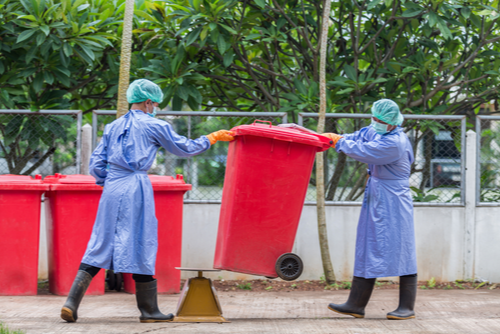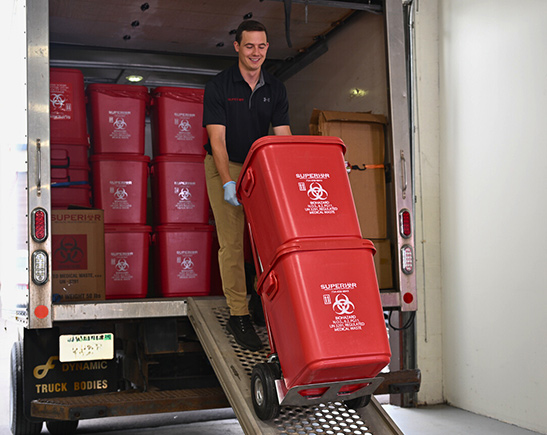Medical Waste Removal Excellence: Elevating Safety Standards in Your Center
Reliable and Eco-friendly Medical Garbage Disposal Solutions
In the ever-evolving field of medical care, the problem of medical waste disposal stays a subject of paramount value. As medical facilities, facilities, and other medical care centers make every effort to provide quality patient care, they need to additionally deal with the difficulty of effectively and responsibly disposing of their waste.
Waste Segregation Practices
Efficient waste partition methods are important to guarantee the secure and correct disposal of clinical waste. Medical waste, that includes materials polluted with possibly transmittable substances, should be handled in a means that decreases the risk of damage to both public health and wellness and the setting. Correct waste partition plays an essential duty in achieving this objective.
Waste segregation involves the separation of various sorts of waste based on their qualities and prospective dangers. This process makes sure that each sort of waste is dealt with and dealt with appropriately (medical waste disposal services with WasteX). It begins at the factor of generation, where healthcare centers must have marked bins and containers for different waste categories, such as sharps, transmittable waste, pharmaceutical waste, and non-hazardous waste
By segregating clinical waste at the source, doctor can protect against cross-contamination and minimize the risk of direct exposure to infectious representatives. This method also assists in the recycling and recovery of specific materials. Setting apart and recycling clean plastics and glass lowers the demand for raw products and minimizes the ecological influence of medical waste disposal.

Autoclaving and Sanitation Strategies
In order to guarantee the proper and secure disposal of medical waste following efficient waste segregation techniques, healthcare centers must use autoclaving and sanitation techniques. Autoclaving is a commonly used technique that utilizes high-pressure heavy steam to disinfect medical waste.
This involves treating the waste with chemicals such as ethylene oxide or hydrogen peroxide, which kill microorganisms by disrupting their mobile framework. It is crucial to keep in mind that chemical sanitation calls for proper handling and disposal of the chemicals utilized, as they can be harmful to human wellness and the setting if not taken care of appropriately.
On-Site Waste Therapy Solutions
Healthcare facilities have executed on-site waste treatment systems to deal with the disposal of clinical waste in a secure and reliable fashion. These systems give a convenient and economical service for managing medical waste created within the facility. On-site waste therapy systems make use of different innovations to treat and dispose of clinical waste on-site, decreasing the requirement for transportation to off-site facilities.
One commonly utilized on-site waste treatment system is the microwave technology. This modern technology makes use of microwave energy to disinfect and sterilize medical waste, minimizing its quantity and making it risk-free for disposal. One more system is the chemical sanitation technology, which entails dealing with medical waste with chemicals to kill pathogens and lower its harmful nature. This technique is particularly effective for fluid clinical waste.
They remove the danger of medical waste being mishandled during transport, lowering the capacity for contamination and exposure to harmful substances. On-site therapy systems minimize the general environmental influence of clinical waste by lessening transportation and the need for land fill area.
Recycling and Repurposing Efforts
As medical care facilities strive for sustainable waste management practices, they are increasingly exploring recycling and repurposing efforts as a way of minimizing the environmental effect of medical waste. Recycling and repurposing campaigns involve finding ingenious methods to reuse or change medical waste into new items or products. This not just aids to lessen the volume of waste that ends up in burners or land fills however likewise decreases the consumption of resources and power needed for producing new products.
One instance of recycling in the healthcare sector is the reprocessing of single-use clinical gadgets. These gadgets, such as surgical tools or catheters, are normally disposed of after a single usage. However, advancements in technology and rigorous sanitation procedures have made it feasible to securely clean, decontaminate, and recycle Discover More Here these devices numerous times. This not only minimizes the amount of waste created but additionally conserves healthcare centers significant expenses associated with buying brand-new tools.
An additional reusing effort entails the recycling of plastic containers, such as medication bottles or syringe casings. These containers can be gathered, arranged, and sent out to recycling facilities where they are processed, thawed down, and transformed into brand-new plastic items. This helps to save sources and decrease the need for virgin plastic manufacturing.
In addition to recycling, repurposing campaigns involve finding alternate usages for clinical waste. For instance, shredded paper waste from clinical documents or product packaging products can be repurposed as bedding material for animals or as insulation material (medical waste removal services). Natural waste such as food scraps from health care centers can be composted and utilized as plant food in yards or agricultural areas.

Renewable Resource Solutions
One reliable technique to reducing the environmental impact of healthcare operations entails applying renewable resource options. Health care facilities, such as centers and medical facilities, consume significant amounts of power for different purposes, including lights, heating, cooling, and operating useful reference clinical devices. By transitioning to sustainable energy resources, these facilities can considerably reduce their carbon impact and add to a much more lasting future.

Implementing renewable resource solutions in health care centers not only lowers greenhouse gas emissions but likewise uses long-lasting expense savings. While the first financial investment in renewable energy facilities might be greater, the lasting functional costs of renewable resource systems are dramatically reduced contrasted to traditional fossil fuel-based energy sources. Additionally, sustainable power systems are reliable and can provide a undisturbed and steady power supply, guaranteeing continuous healthcare services even throughout power outages or emergency situations.
Verdict
In final thought, executing eco friendly and reliable medical waste disposal remedies is necessary for maintaining a lasting healthcare system. By taking on waste segregation methods, autoclaving and sterilization methods, on-site waste therapy systems, recycling and repurposing efforts, and renewable energy remedies, healthcare centers can significantly minimize their environmental effect.
It begins at the factor of generation, where medical care centers need to have marked containers and containers for different waste groups, such as sharps, infectious waste, pharmaceutical waste, and non-hazardous waste.
In order to guarantee the secure and correct disposal of clinical waste adhering to effective waste segregation techniques, healthcare facilities have to employ autoclaving and sterilization strategies.Medical care find out here now facilities have carried out on-site waste treatment systems to resolve the disposal of clinical waste in a reliable and secure manner. On-site waste treatment systems utilize various innovations to get rid of and deal with of clinical waste on-site, minimizing the demand for transport to off-site centers.
As healthcare facilities strive for sustainable waste management practices, they are progressively checking out recycling and repurposing campaigns as a method of lowering the ecological influence of clinical waste. - medical waste removal